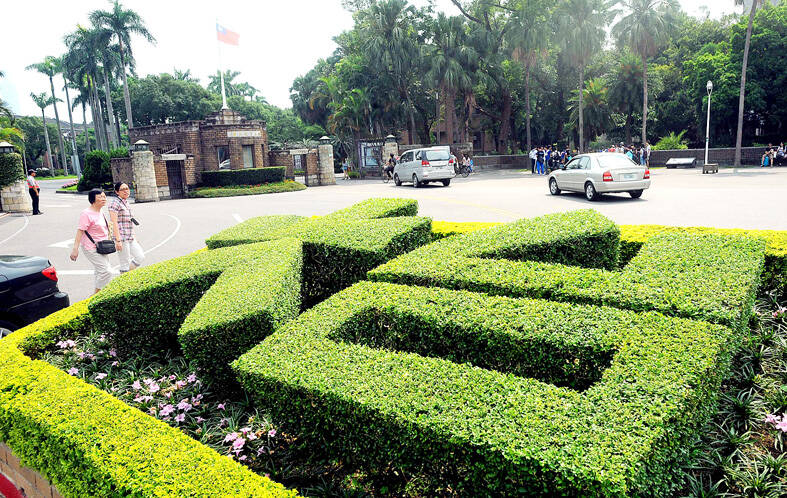Taiwan has experienced its most significant improvement in the QS World University Rankings by Subject, data provided on Sunday by international higher education analyst Quacquarelli Symonds (QS) showed.
Compared with last year’s edition of the rankings, which measure academic excellence and influence, Taiwanese universities made great improvements in the H Index metric, which evaluates research productivity and its impact, with a notable 30 percent increase overall, QS said.
Taiwanese universities also made notable progress in the Citations per Paper metric, which measures the impact of research, achieving a 13 percent increase.

Photo: Lin Cheng-kung, Taipei Times
Taiwanese universities gained 10 percent in Academic Reputation, but declined 18 percent in Employer Reputation, following a survey of 98,000 hiring managers, human resources workers and talent managers who listed their preferred universities when running recruitment drives.
“Taiwan, home to 24 million people, is a cornerstone of academic prowess in Asia, boasting the second-highest concentration of ranked universities per capita in the region in the 14th edition of the QS World University Rankings,” QS senior vice president Ben Sowter said.
“This remarkable feat not only underscores the robustness of Taiwan’s higher education system but also speaks volumes about its regional and global competitiveness,” he said.
Taiwan’s higher education landscape has made notable strides this year, Sowter said, adding that “significant improvements in research impact indicators signal a burgeoning influence on the global academic stage.”
However, Sowter said that the challenges Taiwan still faces, evidenced by its declines in the Employer Reputation and International Research Network indicators, which he said served as a reminder of the importance of fostering stronger ties with employers and diversifying research collaboration.
Sowter highlighted National Taiwan University (NTU) as being renowned for its stellar performance and unwavering commitment to innovation.
NTU, which consistently ranks in the top 10 in Asia, is a testament to Taiwan’s academic prestige, he said.
This year’s edition of the QS World University Rankings by Subject is an independent, comparative analysis of the academic excellence and influence of more than 1,500 universities in 96 countries and territories, across 55 academic disciplines and five broad faculty areas.
NTU appeared in 44 of the 55 subjects evaluated and was the highest-ranked Taiwanese university. It featured in the global top 20 for Classics and Ancient History, and the top 50 for Library and Information Management, Social Policy and Administration, Modern Languages and Sociology.
Other Taiwanese universities featured in the global top 50 were Taipei Medical University (25th, Nursing), National Taiwan Normal University (27th, Education), National Chengchi University (30th, Classics and Ancient History) and National Kaohsiung University of Hospitality and Tourism (38th, Hospitality and Leisure Management).
NTU secured the ninth spot in Asia with 32 entries in the top 100.
The university also shared seventh spot in Asia for its number of top 200 entries, along with the National University of Singapore and Peking University, with all three institutions having 44 entries in the tier.
Taiwan has the second-highest concentration of ranked universities per capita in Asia, with one ranked university per 956,931 people, following Hong Kong, which had one ranked university per 832,401 people.

SECURITY: As China is ‘reshaping’ Hong Kong’s population, Taiwan must raise the eligibility threshold for applications from Hong Kongers, Chiu Chui-cheng said When Hong Kong and Macau citizens apply for residency in Taiwan, it would be under a new category that includes a “national security observation period,” Mainland Affairs Council (MAC) Minister Chiu Chui-cheng (邱垂正) said yesterday. President William Lai (賴清德) on March 13 announced 17 strategies to counter China’s aggression toward Taiwan, including incorporating national security considerations into the review process for residency applications from Hong Kong and Macau citizens. The situation in Hong Kong is constantly changing, Chiu said to media yesterday on the sidelines of the Taipei Technology Run hosted by the Taipei Neihu Technology Park Development Association. With

A US Marine Corps regiment equipped with Naval Strike Missiles (NSM) is set to participate in the upcoming Balikatan 25 exercise in the Luzon Strait, marking the system’s first-ever deployment in the Philippines. US and Philippine officials have separately confirmed that the Navy Marine Expeditionary Ship Interdiction System (NMESIS) — the mobile launch platform for the Naval Strike Missile — would take part in the joint exercise. The missiles are being deployed to “a strategic first island chain chokepoint” in the waters between Taiwan proper and the Philippines, US-based Naval News reported. “The Luzon Strait and Bashi Channel represent a critical access

CARROT AND STICK: While unrelenting in its military threats, China attracted nearly 40,000 Taiwanese to over 400 business events last year Nearly 40,000 Taiwanese last year joined industry events in China, such as conferences and trade fairs, supported by the Chinese government, a study showed yesterday, as Beijing ramps up a charm offensive toward Taipei alongside military pressure. China has long taken a carrot-and-stick approach to Taiwan, threatening it with the prospect of military action while reaching out to those it believes are amenable to Beijing’s point of view. Taiwanese security officials are wary of what they see as Beijing’s influence campaigns to sway public opinion after Taipei and Beijing gradually resumed travel links halted by the COVID-19 pandemic, but the scale of

Pope Francis is be laid to rest on Saturday after lying in state for three days in St Peter’s Basilica, where the faithful are expected to flock to pay their respects to history’s first Latin American pontiff. The cardinals met yesterday in the Vatican’s synod hall to chart the next steps before a conclave begins to choose Francis’ successor, as condolences poured in from around the world. According to current norms, the conclave must begin between May 5 and 10. The cardinals set the funeral for Saturday at 10am in St Peter’s Square, to be celebrated by the dean of the College